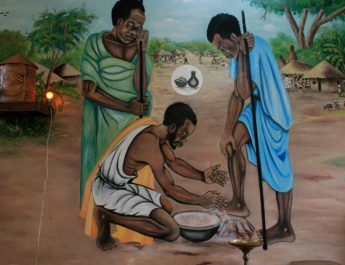Deuteronomy 30:15-20
Ordinary A12
15 See, I have set before youA today lifeB and prosperity,C deathD and adversity.E
A “before you” = paneh. Literally “before your faces.”
B “life” = chay. From chayah (to live or keep alive literally or figuratively). This is alive, living, lifetime. It can also be used to describe someone’s age. It can refer to animals, plants, water, or a company or congregation of people. It is life in a very broad sense.
C “prosperity” = tob. This is good, beautiful, pleasant, agreeable, bountiful, at ease. This word is used for goodness as a concept, a good thing, a good person. This can refer to prosperity and welfare as well as joy, kindness, sweetness, and graciousness. So, this is ethically good, but also enjoyably good.
D “death” = mavet. From muth (to die in a literal or figurative sense). This can be death, deadliness, the dead, or the place where the dead go. It can be used figuratively for pestilence or ruin.
E “adversity” = ra’. From ra’a’ (to be evil, bad, afflict; properly, to spoil – to destroy by breaking into pieces; figuratively, to cause something to be worthless; this is bad in a physical, social, or moral sense; that which displeases, to do harm or mischief, to punish or vex). This is bad, disagreeable, that which causes pain, misery, something having little or no value, something that is ethically bad, wicked, injury, calamity. This refers to anything that is not what it ought to be – a natural disaster, a disfigurement, an injury, a sin.
16 If you obey the commandments of the LordF your GodG that I am commanding you today, by loving the Lord your God, walkingH in his ways,I and observingJ his commandments,K decrees,L and ordinances,M then you shall liveN and become numerous,O and the Lord your God will bless you in the land that you are entering to possess.P
F “Lord” = YHVH. From havah (to be, become) or hayah (to come to pass, become, be). This is the name of the God of Israel, the self-existent and eternal one, the tetragrammaton. This pronunciation has been lost to time so “Lord” is generally used in its place.
G “God” = Elohim.
H “walking” = halak. This is go, come, walk. It is walk literally and figuratively and includes people and animals. It can be used figuratively for one’s moral life – how we walk according to God’s way or against it. It can also refer to the walk of life as in the course one’s life takes, the choices we make, etc.
I “ways” = derek. From darak (to tread, march, to walk. Can also mean affixing a string to a box since one needs to step on it to bend it in the process; so also an archer). This is a road as a thing that is walked on. Can be used figuratively for the path that one’s life takes or how one chooses to live one’s life.
J “observing” = shamar. This is to keep, watch, or preserve. It means to guard something or to protect it as a thorny hedge protects something.
K “commandments” = mitsvot. Related to “commanding” in v16. From tsavah (to charge, command, order, enjoin). This is a commandment, law, ordinance obligation, or tradition. It is something commanded whether by God or by a human authority. This term is sometimes used collectively to refer to the Law.
L “decrees” = chuqqah. From choq (statute, boundary, condition, custom, limit, ordinance; something that is prescribed or something that is owed); from chaqaq (to inscribe, carve, or decree; a lawmaker; literally, this is engraving, but it implies enacting a law because laws were carved into stone or metal). This is something prescribed such as a statue, custom, or ordinance.
M “ordinances” = mishpat. From shaphat (to judge, defend, pronounce judgment, condemn, govern). This is a verdict or formal sentence whether from humans or from God. It includes the act of judging as well as the place that judging takes place, the suit itself, and the penalty. Abstractly, this is justice, which includes the rights of the participants.
N “live” = chayah. Related to “life” in v15. This is to live, revive, nourish, save, keep alive. It is live in a literal or figurative sense.
O “become numerous” = rabah. This is increasing in any aspect whether quantity, authority, size, quality, greatness, etc.
P “possess” = yarash. This is inheriting or dispossessing. It refers to occupying or colonizing – taking territory by driving out the previous inhabitants and living there instead of them. By implication, it can mean to seize or rob, to expel, ruin, or impoverish.
17 But if your heartQ turns away and you do not hear,R but are led astrayS to bow down to other godsT and serveU them, 18 I declare to you today that you shall perish;V you shall not live longW in the land that you are crossingX the Jordan to enter and possess.
Q “heart” = lebab. May be related to labab (to encourage; properly, to be encased as with fat; used in a good sense, this means to transport someone with love; used in a bad sense, it can mean to dull one’s senses). This is the heart, courage, one’s inner self, the mind, or the will. Heart is only used in a figurative sense in the Old and New Testaments.
R “hear” = shama. This is to hear, call, consent, or consider. It implies listening intelligently, giving attention, and, because of these two factors, obedience and action are often implied.
S “led astray” = nadach. This is scatter, seduce, banish, draw away, drive away, outcast, scatter. It means to push off in a literal or figurative sense so it could also be mislead, inflict, or withdraw.
T “gods” = Elohim. Same word as “God” in v16.
U “serve” = abad. This is to work, serve, or compel. It can describe any kind of work or service (including religious devotion). Used causatively, it can mean to enslave or keep in bondage
V “perish” = abad + abad. The word is repeated twice – the first time as an Infinitive Absolute. The Infinitive Absolute serves to emphasize the sentiment of the word. It is rather like Foghorn Leghorn’s speech pattern, “I said, I said.” Also, this “abad” is a different word from “serve” in this same verse. It means, properly, wandering away or losing oneself. So, it implies perishing. In a causative sense, it can mean to destroy or annihilate.
W “you shall not live long” = lo + arak + yom. Literally “you shall not prolong your days.”
X “crossing” = abar. This is to pass over or cross over. It is used for transitions, whether literal or figurative. It can also mean to escape, alienate, or fail. This is the root verb from which “Hebrew” is drawn.
19 I call heavenY and earth to witnessZ against you today that I have set before you life and death, blessingsAA and curses.BB Choose life so that you and your descendantsCC may live, 20 loving the Lord your God, obeyingDD him,EE and holding fastFF to him; for that means life to you and lengthGG of days, so that you may liveHH in the land that the Lord sworeII to give to your ancestors,JJ to Abraham,KK to Isaac,LL and to Jacob.MM
Y “heaven” = shamayim. Root may mean being lofty. This is sky, the air, or heaven. It is in a dual noun form so this might refer to the part of the sky where the clouds move on the one hand and the part beyond that where the sun, moon, and stars are on the other hand.
Z “call…to witness” = uwd. This is to repeat, return, do again. This implies testifying something since that is a repetition. It can also mean to charge, admonish, protest, relieve, restore, or lift up.
AA “blessings” = barakah. Related to “bless” in v16. From barak (to kneel, bless; blessing God as part of worship and adoration; blessing humans to help them; can be used as a euphemism to say curse God). This is blessing, which implies prosperity or peace.
BB “curses” = qelalah. From qalal (to be little, insignificant, swift; to bring down in esteem, create contempt, curse). This is cursing or vilification.
CC “descendants” = zera. From zara (to sow or scatter seed; conceive or yield). This is seed or sowing. It can, thus, mean a fruit, plant, sowing time, child, offspring, or posterity.
DD “obeying” = shama. Same as “hear” in v17.
EE “him” = qol. Literally “his voice.”
FF “holding fast” = dabaq. This is to follow closely or abide fast, to cling or be joined together. Figuratively, it can mean to catch something by chasing after it, to overtake, or to stick.
GG “length” = orek. Related to “live long” in v18. From arak (to be long in a literal or figurative sense, to continue, defer, draw out). This is length, long, or forever.
HH “live” = yashab. This is to sit and so to remain and so to dwell. It is sitting for any reason – as a judge, in order to ambush, or just sitting quietly. Causatively, this can mean settling or marrying. This can also mean continue, endure, or establish.
II “swore” = sheba. From sheba (seven, by seven-fold; it can also be used to imply a week or an indefinite number; symbolically, this is the number of fullness, sacredness, perfection). This verb, properly means to be complete – literally, to seven yourself. In terms of oath taking, this is to swear with the same seriousness as if you had declared the thing seven times.
JJ “ancestors” = ab. Literally, father, but also used for family, chief, and ancestor.
KK “Abraham” = Abraham. From the same as Abiram (exalted father, a high father – lofty) {from ab (father literal or figurative) + rum (rise, bring up, being high, extol, exalt, haughty; to raise in a literal or figurative sense)}. This is Abraham, father of many nations or father of a multitude.
LL “Isaac” = yitschaq. From tsachaq (to laugh, mock, play, make sport; this is laughing out loud whether in joy or in a scornful way). This is Isaac, meaning “he laughs.”
MM “Jacob” = yaaqob. From the same as aqeb (heel, hind part, hoof, rear guard of an army, one who lies in wait, usurper). This is Isaac’s son and his descendants. The name means heel-catcher or supplanter.
Image Credit: “Fork in the road, decision tree, September, Discovery Park, Seattle, Washington, USA” by Wonderlane




